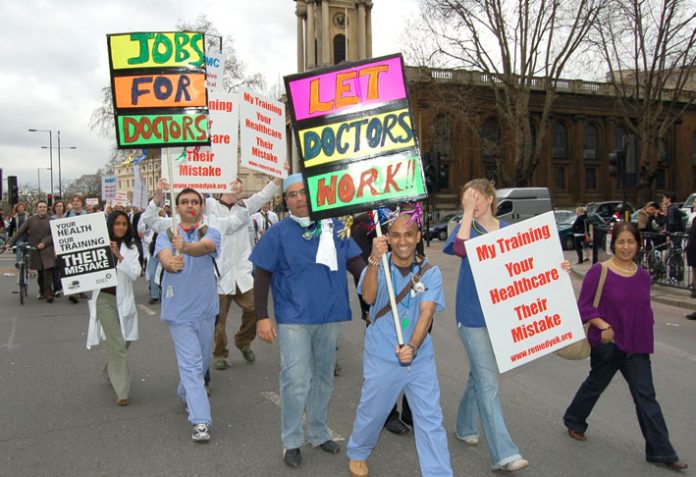
‘Increased use of the private sector is skewing staffing levels in the NHS,’ a UNISON spokeswoman told News Line yesterday.
She was responding to accusations from MPs on the House of Commons Health Select Committee that there has been a ‘disastrous failure’ of NHS workforce planning creating a ‘boom and bust’ approach.
The UNISON spokeswoman added: ‘To cut waiting times and meet targets, trusts have had to employ more staff.
‘Now, because of the increasing use of the private sector, such as the independent treatment centres, the government is looking at staffing levels in the NHS and saying they don’t need more staff.
‘What the government should do is concentrate on building up capacity in the NHS and provide stability for nurses and other health workers.
‘The money should be put directly into the NHS instead of the more expensive private sector treatment.
‘Many private companies have been paid over the odds for operations they have not carried out. This money should be going into the NHS.’
The Health Committee report on workforce planning concluded: ‘It was too easy to throw new staff into the task of meeting targets rather than consider the most cost-effective way of doing the job.’
MPs claimed: ‘The expansion of the workforce was reckless and uncontrolled and increases in funding were often seen as a blank cheque for recruiting new staff.’
The Committee’s report adds: ‘Large pay increases were granted without adequate steps being taken to ensure increases in productivity in return.’
The British Medical Association (BMA) angrily rejected MPs’ claims.
Dr Sam Everington, Deputy Chairman of the BMA, said: ‘We do not agree that the expansion of the medical workforce was reckless and uncontrolled and that pay increases for doctors have not seen a return in productivity.
‘The UK is still critically short of doctors and the BMA has always believed that government goals to increase doctor numbers were too low.
‘Ambitious targets to cut waiting times and improve preventative patient care have only been achieved by increasing the number of health professionals and by doctors delivering on new contracts.
‘The 2003 consultant contract has been successful and has already led to considerable improvements in patient care. There are tools within the contract to directly link consultants’ workload to patient activity.
‘Published evidence on the Quality and Outcomes Framework (QOF) of the new GP contract shows family doctors have exceeded government expectations.
‘As a result of QOF interventions over 8,700 patients in England alone will be saved from potentially life threatening cardiovascular problems over the next five years. This is a direct result of the new contract which rewards family doctors who work more intensely to monitor and prevent illness.
‘Poorly thought through and expensive government policies like independent sector treatment centres, PFI hospital projects, and dismantling general practice are largely to blame for the current mess the NHS is in, not properly negotiated contracts that aimed to reward both sides and improve patient care.
‘As the Health Select Committee report concludes, doctors are now facing job reductions, training and pay cuts.
‘On top of this, the BMA is very concerned that the Government’s new system for medical training appointments (MTAS) has turned into a shambles and will potentially lead to hundreds of junior doctors facing the choice of unemployment or immigration.’
He concluded the government should stop ‘looking for short-term quick fix solutions that may serve political ends but do little to develop and expand the NHS.’